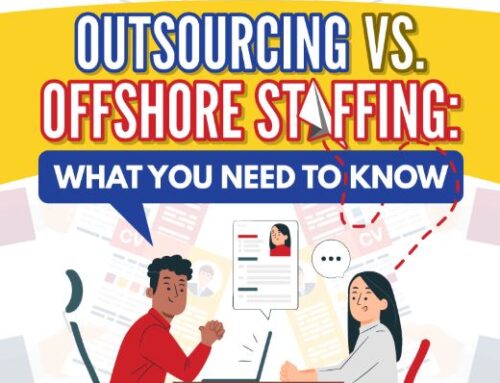Interest in offshore staffing continues to grow as it emerges as a practical solution to the persistent talent shortages among US companies. Recognizing the advantages offshoring provides, more organizations are now exploring setting up their own offshoring teams for various tasks.
However, as with all business initiatives, you should look before you leap. Offshoring, like any other venture, entails potential challenges which could result in problems, or worse, failure. Identifying the risks that offshoring can pose will help managers gain a clearer picture of both its benefits and possible drawbacks.
Common Missteps When Offshoring Staff
There are four potential pitfalls when offshoring. Understanding them in advance will help your organization avoid adverse consequences before operations are in full swing. Here are the top mistakes to avoid when offshore staffing.
1. Choosing the Wrong Offshore Partner
Selecting an offshoring partner that isn’t in alignment with your company’s values, culture, or work ethic is a common mistake which can derail your offshoring strategy. Companies that experienced offshoring failure often point to choosing the wrong partner as a primary reason.
This outcome occurs most frequently when a business fails to thoroughly evaluate potential partners, or prioritizes cost savings over quality of work. To avoid this, conduct careful research on potential providers. Evaluate potential firms based on their qualifications, experience, reviews, and quality of service.
2. Choosing the Wrong Location
Selecting the right country or region is important when a company opts for offshore staff. A mismatch between the company’s goals and the chosen offshoring location can result in increased costs, cultural barriers, and reduced operational control.
Countries like the Philippines and India are two popular destinations for offshoring due to their abundance of diverse talents, affordable prices, and quality service offerings. However, when choosing a location for offshoring, the company should not only base it on popularity. Factors to be considered should include:
- labor costs
- industry infrastructure
- time zone
- work culture
- talent competency
- English proficiency
3. Weak Communication Management
One significant challenge when offshore outsourcing is maintaining effective communications with employees in different locations and time zones. Ineffective communications may also be exacerbated when the chosen location contributes to cultural misalignment. For example, due to different sociocultural norms, offshore staff might do things differently to complete assigned tasks. Without proper communication protocols, misunderstandings may arise and cause operational inefficiencies.
A survey from Forbes Insights and Rosetta Stone found that communication barriers have broad and pervasive impacts in the workplace. Sixty-seven percent (67%) of executives list miscommunications as a leading contributor to inefficiency. Moreover, 40% noted that miscommunication made collaboration initiatives and productivity more difficult.
It is important to set up regular communication through video conferencing platforms, time zone management tools, and project management software for cohesive collaboration. Furthermore, real-time communication and regularly updating all stakeholders on the progress of tasks can help avoid ineffective communication management.
4. Lack of Control Over the Offshored Operation
Handing over some operational tasks to an external team can help businesses improve efficiency and increase their revenue. According to a McKinsey study, companies with a diverse workforce are 36 percent more profitable.
However, while offshoring can help free up time and resources for the company, it can also mean relinquishing a degree of control. That in turn can lead to errors and delays in operations. Defining and communicating expectations is important to mitigate this potential pitfall. That includes clearly articulating the quality standards, timeline, deliverables, and other significant elements related to a given task.
It is also helpful to create a robust Service Level Agreement (SLA) that documents the understanding between your offshore staffing provider and your organization. A well-structured SLA can help ensure performance goals, and provides a written guarantee that your offshoring company meets expectations.
Get Offshore Staffing Right with EVES
Organizations can fully benefit from offshore staffing by making smart decisions that are aligned with their objectives. It is important to avoid rushing to offshore operational tasks to an offshoring provider in the Philippines. Moreover, companies must also perform due diligence when offshoring to guarantee success and achieve their objectives.
Elite Virtual Employment Solutions (EVES) can connect you with highly qualified Filipino talent who can handle your staffing needs – from IT to accounting to tax management. With EVES, you can achieve a greater competitive advantage while lowering your labor costs up to 70% and reducing your overhead by 50%.
Contact us at info@evesolutions.net to staff up offshore for your non-core functions, while you focus on what you do best— running your company.










Leave A Comment
You must be logged in to post a comment.